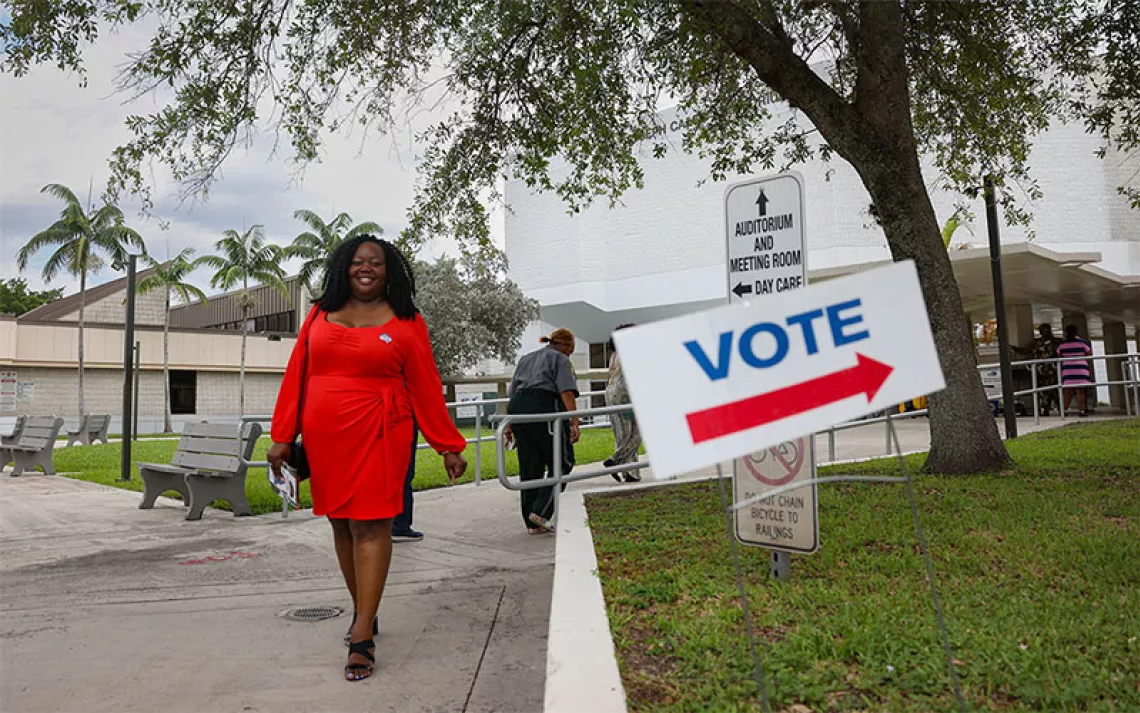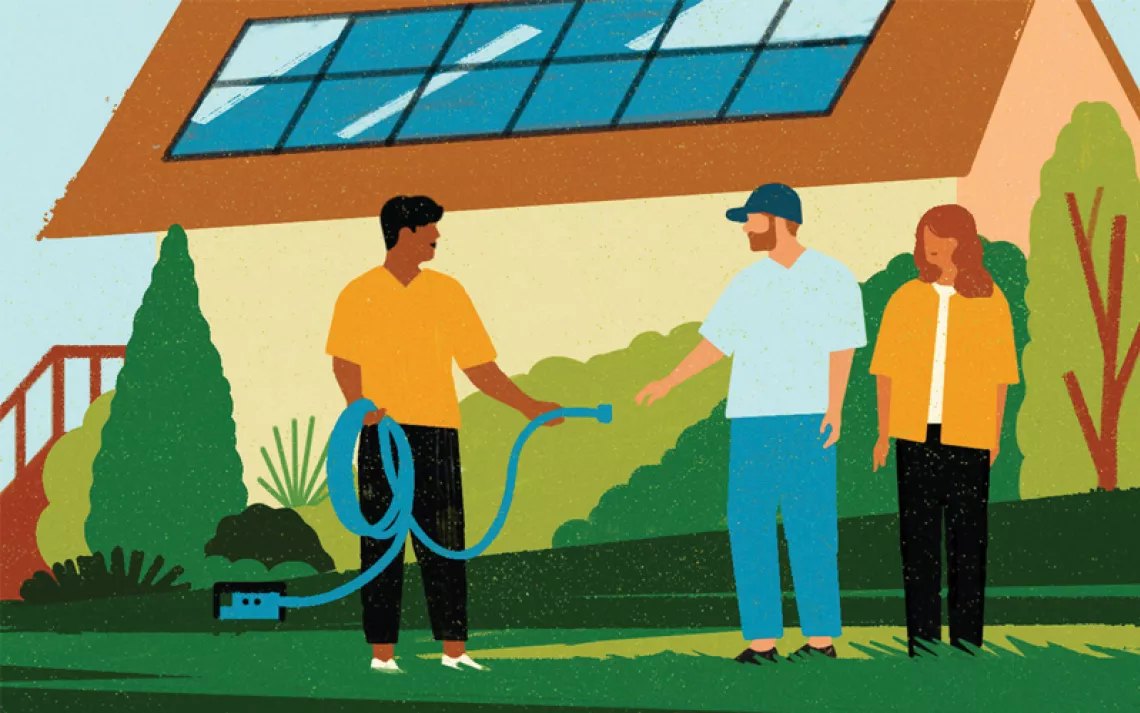Climate Change Is Killing People. Could Fossil Fuel Companies Be Held Criminally Responsible?
Some advocates and legal scholars are suggesting going beyond civil lawsuits

Photo by Beata Zawrzel/NurPhoto via AP
Horrific wildfires. Catastrophic flooding and storms. Oppressive heat. Already, the climate crisis is fueling extreme weather disasters across the United States that are costing billions of dollars in damage—while also taking human lives. Dozens of Americans have died as a result of Hurricane Beryl, which swept through southeast Texas in July. Some of those deaths were attributed to extreme heat exposure after the storm knocked out power and left people without air conditioning. “Extreme heat is the number one weather-related killer in the United States,” President Biden noted in a speech on extreme weather preparedness in early July, in the midst of what some climate advocates and scientists are now calling the “danger season.”
With climate-induced extreme weather increasingly endangering communities, some advocacy groups and legal experts proposing a novel “climate homicide” theory, suggesting that climate-related deaths should not be viewed as natural tragedies but as crimes. The world’s biggest fossil fuel companies, they say, are the primary culprits.
“The case for prosecuting [fossil fuel companies] for climate-related deaths is strong enough to merit the initiation of investigations by state and local prosecutors,” a recent Public Citizen report styled as a model prosecution memo argues. The report lays out the case for pursuing homicide charges against fossil fuel behemoths for deaths caused by extreme heat events, using summer 2023’s brutal southwest heat wave—during which Phoenix recorded 31 consecutive days of temperatures above 110°F—as a case study. That heat wave, which scientists determined would have been “virtually impossible” absent human-driven climate change, killed over 400 people in Maricopa County, Arizona, far exceeding the number of murder deaths in the county that year, the report notes.
Given that fossil fuel companies’ products are the primary cause of global warming and temperature rise, legal experts who authored the report say those companies could be charged with crimes like reckless manslaughter or even second-degree murder.
“Fossil fuel companies know what is happening. And yet they have deceived, and disinformed, the public and regulators for decades,” said Donald Braman, an associate professor of criminal law at George Washington University and a coauthor of the report. “I don’t think that fraud captures the degree to which that conduct is antisocial and destructive to our society. I think that the criminal law speaks much more clearly to that type of conduct.”
While the idea of prosecuting a company like ExxonMobil for murder might seem far-fetched, legal experts say the evidence from company and industry documents demonstrate that these companies knew of the potentially disastrous and “catastrophic” consequences of fossil fuel dependency, which speaks to an intentionality that is key to the definition of homicide.
“They called it ‘globally catastrophic.’ That’s their phrase. That’s from a 1980 task force of the American Petroleum Institute, and it’s just one example. These documents show fossil fuel companies knew their conduct was dangerous,” David Arkush, director of Public Citizen’s climate program and a coauthor of the report, said during a recent virtual panel.
In another example, former American Petroleum Institute president Frank Ikard, discussing the key findings of a Lyndon Johnson administration report on global warming and fossil fuels at a 1965 oil industry meeting, warned that “there is still time to save the world’s peoples from the catastrophic consequence of pollution, but time is running out.”
Braman explained that some states like Pennsylvania have laws that criminalize risking or causing catastrophe. “I think that beautifully encapsulates exactly what this conduct is,” he said. “Those statutes, along with the homicide statutes, I think capture the degree to which fossil fuel companies have disregarded the health and welfare and lives of the public as they have pursued these massive profits at public expense.”
There are, of course, significant practical challenges and feasibility questions surrounding any attempt to go after Big Oil for homicide. But at least on a theoretical level, the legal basis is solid, the report authors say.
“There’s less skepticism on the fundamental premise and legal theory from folks who actually do this [criminal law] work,” Aaron Regunberg, senior policy counsel with Public Citizen’s climate program, told Sierra.
The Public Citizen report suggests that potential defendants in a criminal case could include major investor-owned fossil fuel companies such as ExxonMobil, Chevron, Shell, BP, ConocoPhillips, Occidental, BHP, and Peabody, as well as the American Petroleum Institute, the oil industry’s chief lobby group. The planet-heating pollution they have collectively generated since 1965 amounts to more than 15 percent of all fossil fuel emissions since the start of the Industrial Revolution, according to the report.
While criminal prosecution of oil companies for deaths from extreme heat or other climate disasters may be unprecedented, large fossil fuel companies have faced homicide charges previously. BP pled guilty to felony manslaughter and agreed to pay $4 billion in criminal fines and penalties for its role in the 2010 Deepwater Horizon oil rig blowout that killed 11 people. The California utility PG&E pled guilty to 84 counts of manslaughter and agreed to pay a $3.5 million fine over its role in the 2018 Camp Fire, which destroyed the town of Paradise and killed 84 people.
But proving that such entities can be held liable for specific heat-related deaths under criminal law, which comes with the heightened standard of proof of guilt beyond a reasonable doubt, may be especially difficult.
“It’s going to be a very different animal, proving causation in a criminal case,” said Jennifer Rushlow, an environmental law professor at Vermont Law and Graduate School who was not involved with the report.
Prosecutors would need to establish three parts of a causal chain: First, that a specific extreme weather disaster, like a heat wave, caused a particular death. Second, that climate change caused or substantially increased the likelihood of that disaster, which relies on a branch of climate attributions science called event attribution. And third, that particular defendants caused or substantially contributed to causing climate change, which is informed by another branch of attribution science called source attribution that can pinpoint the percentage of total fossil-fuel-based emissions attributable to certain companies or sources.
How would prosecutors meet these tests? In addition to demonstrating particular companies’ direct contribution to global emissions, or the percentage of emissions that result from their fossil fuel extraction, prosecutors could point to companies’ roles in disseminating climate disinformation and obstructing policies intended to curb climate pollution. “We think there’s a real causative argument there to say that if these companies had not engaged in those fraudulent actions and campaigns, which were specifically designed to block or delay the clean energy transition, climate change would not be as advanced or as destructive as it is today,” Regunberg said.
Since much of the causation equation depends upon climate attribution science, it is fair to question whether this science is up to the task. It is a relatively new and rapidly evolving field of research and has yet to be tested in court in US climate accountability litigation.
“Attribution science is really robust,” Carly Phillips, research scientist with the Union of Concerned Scientists’ Science Hub for Climate Litigation, told Sierra. In terms of event attribution, she said it tends to be even stronger when looking at events most closely related to temperature, like extreme heat. “For something like a heat wave,” Phillips said, “we have seen studies come out that have said this heat wave would have been virtually impossible without climate change.”
Cindy Cho, a coauthor of the Public Citizen report who served for over a decade as a federal prosecutor and now teaches at Indiana University’s Mauer School of Law, said during the virtual panel that she was initially skeptical about the climate homicide idea. “My first skepticism is about the difficulty, she said. “I’m thinking it’s going to be hard to draw a line from a person at a company though a number of decisions to a harm at the end of the line.”
The idea of suing some of the most powerful corporations on the planet in an unprecedented criminal proceeding will likely seem daunting to some prosecutors. Many district attorney offices are understaffed and lack the resources to go toe-to-toe with the Exxons of the world. “The cost of taking on the fossil fuel companies is likely to be exorbitant,” Braman said.
According to Regunberg, multiple prosecutors’ offices have expressed interest in the strategy, including ones with significant resources. But even if a prosecutor were to try to go down this path, would a criminal proceeding against these large fossil fuel companies go anywhere? Big Oil is already facing dozens of civil climate accountability lawsuits from state and local governments, but these cases have been bogged down in procedural battles, and it is unclear when, or even if, any of them will get to trial.
One advantage to leveraging criminal law, legal experts say, is that criminal cases tend to move faster than civil cases, and criminal defendants typically do not have as many “off ramps” or opportunities to obstruct or get a case tossed out.
“There are far fewer procedural barriers in criminal cases,” Braman said. He and other authors of the Public Citizen report also say that one of the fossil fuel industry’s main defenses in the civil climate suits—their argument that federal laws like the Clean Air Act preempt state tort claims pertaining to climate change—would not be a viable defense in a criminal case. “States’ ability to prosecute homicides within their borders is a core state police power,” the report explains, adding, “there is no precedent for preemption of any generally applicable criminal law, let alone a homicide statute.”
Even so, trying to prosecute fossil fuel firms for murder or other criminal offenses is not going to be smooth sailing.
“It’s not a slam-dunk. And is it going to be easy? No,” Cho said during the virtual panel. “I can only imagine the number of pretrial motions and the knock-down, drag-out battle that this kind of case could entail.”
For Regunberg, using criminal law to try to hold major fossil fuel companies accountable for mounting climate harms is an idea whose time has come.
“People are feeling the crazy heat this summer. They’re seeing wildfires again raging out of control,” he said. “There’s a growing recognition I think that public safety isn’t just protection from street-level offenses. It also includes safety from the larger threats and dangers our communities are facing, and climate is at the very top of that list in so many places.”
 The Magazine of The Sierra Club
The Magazine of The Sierra Club



